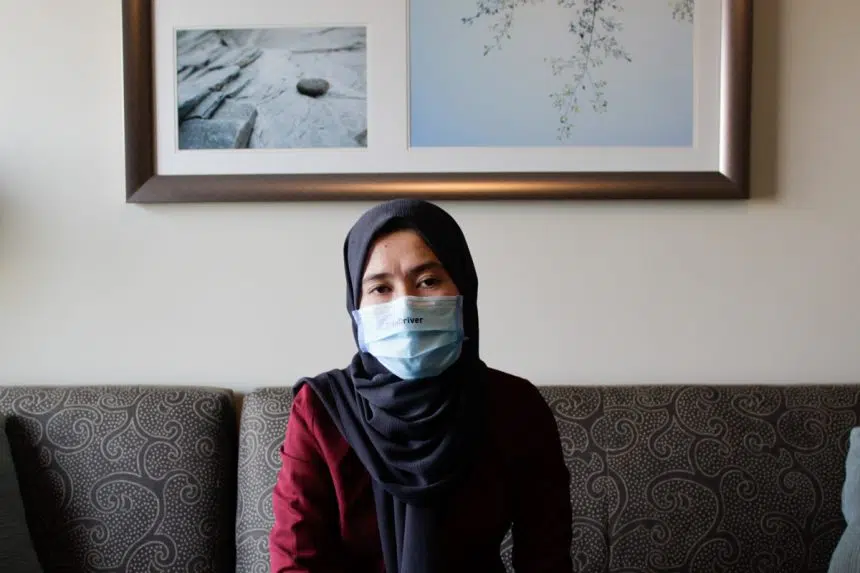Zahrah Shirdel and Farkhonda Tahery’s lives changed when the Taliban took over Afghanistan in late August, after the departure of American soldiers who’d been stationed in the country for the past two decades.
With a laugh, Shirdel said nobody believed the Taliban when they initially promised women would still be allowed to attend school and participate in society as they had been.
“Not for a moment,” Tahery translated Shirdel’s response.
Both Shirdel and Tahery speak Dari Persian, a dialect of the Persian language. Though both women understand English, Tahery acted as a translator for Shirdel throughout the course of her interview with 650 CKOM.
The two women received help from the Toronto-based organization Prince’s Trust in escaping Afghanistan about 15 days after the Taliban took control of the Kabul government. Though the situation was not life or death during that time, Shirdel spent those two weeks hardly leaving her home.
“People felt unsafe,” Shirdel said through Tahery, adding that some people were punished.
The first concern raised for women was the matter of wearing hijabs. Shirdel explained that some of her friends had gone out in normal clothing they would have worn pre-Taliban after the government was taken over.
“In Afghanistan, we wear full Islamic hijab, though not the definition of the Taliban,” Shirdel said, explaining that her current attire — skinny black pants, a flowing red tunic and a black hijab covering her hair — did not meet the requirements of the Taliban.
While Shirdel wears a hijab herself, the Taliban do not accept the version of the hijab she has defined for herself, she said. She does not wish to wear the stricter coverings the Taliban require.
“They have their own extremist definition of hijab and if people didn’t follow that, that would have been a problem for women,” she said.
She said she’d heard that some Taliban members had torn off the pants of one of the girls who had ventured out in their regular clothes and threatened them with punishment if they ever left their homes again not wearing the extremist version of their head coverings.

Farkhonda Tahery and Zahrah Shirdel in a room at the Staybridge Suites in Saskatoon on Oct. 5, 2021. Shirdel and Tahery recently immigrated to Canada with the help of Prince’s Trust Canada after the Taliban seized control of the country in August. (Libby Giesbrecht/650 CKOM)
The Taliban take over
Before the Taliban took control, Shirdel said there were plenty of problems in Afghanistan, including poverty and security threats, but these were normal. Within the safe area of their community, women could go to university and school and people could travel between different Afghanistan provinces and work with various organizations.
It was a “very normal life,” Shirdel explained. “But when (the) Taliban came, everything collapsed.”
To protect the safety of people still in their city, 650 CKOM is not naming Shirdel’s community or specific locations within Afghanistan where she and Tahery travelled to leave the country.
Shirdel explained that nobody believed the Taliban would take over major cities once the American soldiers left. Many people were initially glad the Americans were leaving because they believed it would give Afghanistan greater freedom and a chance to be more independent with their government. However, experts warned that the government wouldn’t be able to survive without American military support.
“There was always a threat,” she said, explaining that just months before the Afghanistan government fell to the Taliban, a significant travel passage had been blocked by the Taliban. People could not pass through that way without being stopped and searched, and the Taliban would often choose people they would take to hold or kill before allowing the others in the group to travel on.
Security in various areas of the country worsened as soldiers began to leave. The Taliban began to gain control of smaller regions in remote areas before moving to small towns and cities. Still, Shirdel said she didn’t think she’d see a major city like Kabul fall, let alone in a matter of hours.
“That was shocking and still is,” Tahery translated. “She says ‘I cannot even explain how I feel when I think about that.’”
The fall of Kabul was when many Afghan people began to panic.
Around that time, photos and videos of members of the Taliban playing on exercise equipment at the Kabul palace began to circulate in western media.
“When I was looking at them, I was hating those people because they took our country and took over our life. But then I … was sympathizing with those people because they had never had the chance to see all those stuff because they had always been in the mountains fighting and they have not even been close to people,” she explained. “Everything was new for them.”
Escape from Afghanistan
As a teacher and social activist, Shirdel knew it was time to leave when she began to see her opportunities for work and education closing.
“Every girl and woman in Afghanistan felt that they have to leave Afghanistan the moment the Taliban took over,” she said. “If they want to be safe, that (was) the first (thought) to cross their mind.”
After many delays and cancellations, Shirdel escaped with a group of other Afghans to Abu Dhabi before travelling to Mexico, where they remained for two weeks.
Shirdel said she spent most of her time in Mexico in shock, having left Afghanistan so quickly. It was her first chance to process what had happened. However, she said she really enjoyed experiencing Mexico and looks back with laughter on two incidents that happened while she was there.
The first occurred during a storm. When a big bolt of lightning struck, Shirdel didn’t realize what it was and it frightened her.
“She thought it was an explosion … she is still afraid of noises and such,” Tahery translated. “She was thinking it was a big explosion that exploded the whole city.”
The second incident occurred when an earthquake hit Mexico, shaking the tall building Shirdel and her fellow immigrants were staying in. They were on the 28th floor.
A new home
She doesn’t know exactly why, but the minute she reached Saskatoon, Shirdel said she felt like she’d come home. In fact, she’s already making plans for the future.
Starting with improving her English, Shirdel wants to finish her Master of Business Administration studies and get her degree in public policy accredited. If this process is going to be more lengthy, she looks forward to getting a job so she can support herself and her family, who she hopes to bring here from Iran at some point in the future.
When she finishes her schooling, Shirdel hopes to be a businesswoman.
Reflecting on her journey and her new home, Shirdel wants Canadians to understand that Afghanistan is more than the war-torn images often seen in the media. She said her country is filled with kind people and many young people who are very invested in education — especially women.
“They really work hard to make sure that they do something for themselves, for their family and for their country,” she said through Tahery.
She said she believes Afghanistan could become a developed country with a stable government that supports its people.
“People are very willing to work toward that.”







